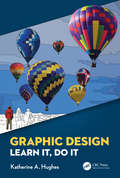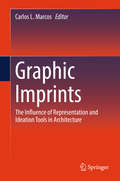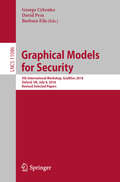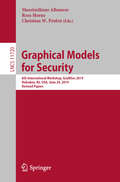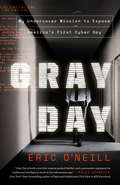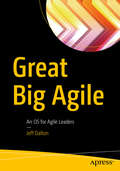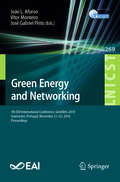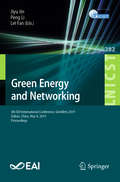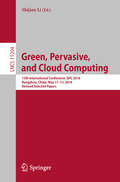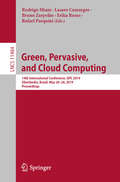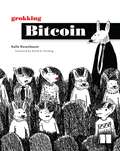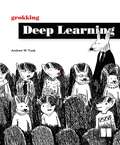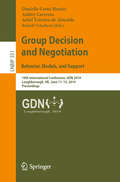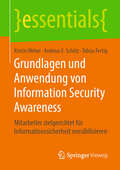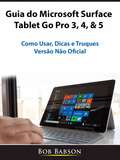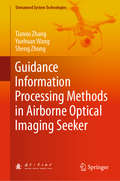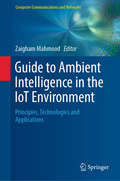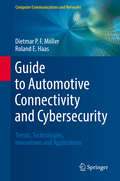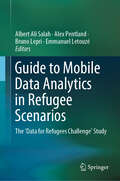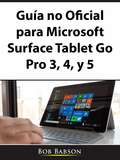- Table View
- List View
Graphic Design: Learn It, Do It
by Katherine A. HughesGraphic Design: Learn It, Do It is introduction to the fundamentals of graphic design and the Adobe Creative Cloud applications used to put these concepts into practice. This book is intended for production-oriented audiences, those interested in the what, why and how of graphic design. The "what" is effective graphic design, a visual solution created using the design principles that stands out in a crowded marketplace. This discussion includes color theory, typography and page layout. Focus on the "why" of design begins with the reasons why we communicate. Attention is paid to the purpose of the visual solution and to its audiences. The conversation highlights output options (print vs. onscreen) and their related file properties. The "how" of design addresses the stages of production and use of Adobe Photoshop CC, Illustrator CC and InDesign CC to translate an idea into a visual solution. Following an overview of each application and its uses, step-by-step exercises are provided to foster familiarity with each application’s workspace and its tools. These exercises provide opportunities to implement the design principles and to produce examples of work for a design portfolio. Key Features: Content based on over a decade’s worth of experience teaching graphic design Contemporary examples and online references Guided exercises for working in the Adobe Creative Cloud applications, Photoshop CC, Illustrator CC and InDesign CC Accompanying exercise files and supporting materials available for download from the book’s companion website Discussion questions and activities included at the end of chapters to expand the presented topics
Graphic Imprints: The Influence Of Representation And Ideation Tools In Architecture
by Carlos L. MarcosThis is the Proceedings of the International Congress of Graphic Design in Architecture, EGA 2018, held in Alicante, Spain, May 30-June 1, 2018. About 200 professionals and researchers from 18 different countries attended the Congress. This book will be of interest to researchers in the field of architecture and Engineering. Topics discussed are Innovations in Architecture, graphic design and architecture, history and heritage among others.
Graphical Models for Security: 5th International Workshop, GraMSec 2018, Oxford, UK, July 8, 2018, Revised Selected Papers (Lecture Notes in Computer Science #11086)
by George Cybenko David Pym Barbara FilaThis book constitutes revised selected papers from the 5th International Workshop on Graphical Models for Security, GraMSec 2018, held in Oxford, UK, in July 2018. The 7 full papers presented in this volume were carefully reviewed and selected from 21 submissions. The book also contains one invited talk. The contributions deal with the latest research and developments on graphical models for security.
Graphical Models for Security: 6th International Workshop, GraMSec 2019, Hoboken, NJ, USA, June 24, 2019, Revised Papers (Lecture Notes in Computer Science #11720)
by Massimiliano Albanese Ross Horne Christian W. ProbstThis book constitutes revised papers from the 6th International Workshop on Graphical Models for Security, GraMSec 2019, held in Hoboken, NJ, USA, in June 2019. The 8 full papers presented in this volume were carefully reviewed and selected from 15 submissions. The book also contains two invited talk. The contributions deal with the latest research and developments on graphical models for security.
Gray Day: My Undercover Mission to Expose America's First Cyber Spy
by Eric O'NeillA cybersecurity expert and former FBI "ghost" tells the thrilling story of how he helped take down notorious FBI mole Robert Hanssen, the first Russian cyber spy.Eric O'Neill was only twenty-six when he was tapped for the case of a lifetime: a one-on-one undercover investigation of the FBI's top target, a man suspected of spying for the Russians for nearly two decades, giving up nuclear secrets, compromising intelligence, and betraying US assets. With zero training in face-to-face investigation, Eric found himself in a windowless, high-security office in the newly formed Information Assurance Section, tasked officially with helping the FBI secure its outdated computer system against hackers and spies--and unofficially with collecting evidence against his new boss, Robert Hanssen, an exacting and rage-prone veteran agent with a disturbing fondness for handguns. In the months that follow, Eric's self-esteem and young marriage unravel under the pressure of life in Room 9930, and he questions the very purpose of his mission. But as Hanssen outmaneuvers an intelligence community struggling to keep up with the new reality of cybersecurity, he also teaches Eric the game of spycraft. Eric will just have to learn to outplay his teacher if he wants to win. A tension-packed stew of power, paranoia, and psychological manipulation, Gray Day is also a cautionary tale of how the United States allowed Russia to become dominant in cyberespionage--and how we might begin to catch up.
Great Big Agile: An OS for Agile Leaders
by Jeff DaltonBig Agile leaders need an empirical, "high-trust" model that provides guidance for scaling and sustaining agility and capability throughout a modern technology organization. This book presents the Agile Performance Holarchy (APH)—a "how-ability" model that provides agile leaders and teams with an operating system to build, evaluate, and sustain great agile habits and behaviors. The APH is an organizational operating system based on a set of interdependent, self-organizing circles, or holons, that reflect the empirical, object-oriented nature of agility. As more companies seek the benefits of Agile within and beyond IT, agile leaders need to build and sustain capability while scaling agility—no easy task—and they need to succeed without introducing unnecessary process and overhead. The APH is drawn from lessons learned while observing and assessing hundreds of agile companies and teams. It is not a process or a hierarchy, but a holarchy, a series of performance circles with embedded and interdependent holons that reflect the behaviors of high-performing agile organizations. Great Big Agile provides implementation guidance in the areas of leadership, values, teaming, visioning, governing, building, supporting, and engaging within an all-agile organization. What You’ll Learn Model the behaviors of a high-performance agile organizationBenefit from lessons learned by other organizations that have succeeded with Big AgileAssess your level of agility with the Agile Performance HolarchyApply the APH model to your businessUnderstand the APH performance circles, holons, objectives, and actionsObtain certification for your company, organization, or agency Who This Book Is For Professionals leading, or seeking to lead, an agile organization who wish to use an innovative model to raise their organization's agile performance from one level to the next, all the way to mastery
Green Energy and Networking: 5th EAI International Conference, GreeNets 2018, Guimarães, Portugal, November 21–23, 2018, Proceedings (Lecture Notes of the Institute for Computer Sciences, Social Informatics and Telecommunications Engineering #269)
by João L. Afonso Vítor Monteiro José Gabriel PintoThis book constitutes the refereed post-conference proceedings of the 5th EAI International Conference on Green Energy and Networking, GreeNets 2018, held in Guimarães, Portugal, in November 2018. The 15 full papers were selected form 26 submissions and cover a wide spectrum of ideas to reduce the impact of the climate change, while maintaining social prosperity. In this context, growing global concern leads to the adoption of the new technological paradigms, especially for the operation of future smart cities.
Green Energy and Networking: 6th EAI International Conference, GreeNets 2019, Dalian, China, May 4, 2019, Proceedings (Lecture Notes of the Institute for Computer Sciences, Social Informatics and Telecommunications Engineering #282)
by Peng Li Jiyu Jin Lei FanThis book constitutes the refereed post-conference proceedings of the 6th EAI International Conference on Green Energy and Networking, GreeNets 2019, held in Dalian, China, May 5, 2019. The 30 full papers were selected form 44 submissions and cover a wide spectrum of ideas to reduce the impact of the climate change, while maintaining social prosperity. In this context, growing global concern leads to the adoption of the new technological paradigms, especially for the operation of future smart cities.
Green, Pervasive, and Cloud Computing: 13th International Conference, GPC 2018, Hangzhou, China, May 11-13, 2018, Revised Selected Papers (Lecture Notes in Computer Science #11204)
by Shijian LiThis book constitutes the proceedings of the 13th International Conference on Green, Pervasive, and Cloud Computing, GPC 2018, held in Hangzhou, China, in May 2018.The 35 full papers included in this volume were carefully reviewed and selected from 101 initial submissions. They are organized in the following topical sections: network security, and privacy-preserving; pervasive sensing and analysis; cloud computing, mobile computing, and crowd sensing; social and urban computing; parallel and distributed systems, optimization; pervasive applications; and data mining and knowledge mining.
Green, Pervasive, and Cloud Computing: 14th International Conference, GPC 2019, Uberlândia, Brazil, May 26–28, 2019, Proceedings (Lecture Notes in Computer Science #11484)
by Rodrigo Miani Lasaro Camargos Bruno Zarpelão Erika Rosas Rafael PasquiniThis book constitutes the proceedings of the 14th International Conference on Green, Pervasive, and Cloud Computing, GPC 2019, held in Uberlândia, Brazil, in May 2019. The 17 full papers included in this volume were carefully reviewed and selected from 38 initial submissions. They are organized in the following topical sections: machine learning; Internet of Things and mobility; cloud and related technologies.
Grokking Bitcoin
by Kalle RosenbaumSummaryIf you think Bitcoin is just an alternative currency for geeks, it's time to think again. Grokking Bitcoin opens up this powerful distributed ledger system, exploring the technology that enables applications both for Bitcoin-based financial transactions and using the blockchain for registering physical property ownership. With this fully illustrated, easy-to-read guide, you'll finally understand how Bitcoin works, how you can use it, and why you can trust the blockchain.Foreword by David A. Harding, Contributor to Bitcoin documentation.Purchase of the print book includes a free eBook in PDF, Kindle, and ePub formats from Manning Publications.About the TechnologyInflation, depressed economies, debased currencies ... these are just a few of the problems centralized banking has caused throughout history. Bitcoin, a digital currency created with the ambition to shift control away from change-prone governments, has the potential to bring an end to those problems once and for all. It's time to find out how it can help you.About the BookGrokking Bitcoin explains why Bitcoin's supporters trust it so deeply, and why you can too. This approachable book will introduce you to Bitcoin's groundbreaking technology, which is the key to this world-changing system. This illustrated, easy-to-read guide prepares you for a new way of thinking with easy-to-follow diagrams and exercises. You'll discover how Bitcoin mining works, how to accept Bitcoin, how to participate in the Bitcoin network, and how to set up a digital wallet.What's insideBitcoin transactionsThe blockchainBitcoin miningBitcoin walletsAbout the ReaderIntended for anyone interested in learning about Bitcoin technology. While a basic understanding of technical concepts is beneficial, no programming skills are necessary.About the AuthorKalle Rosenbaum is a computer scientist, an avid Bitcoin supporter, and the founder of Propeller, a Bitcoin consultancy.Table of ContentsIntroduction to BitcoinCryptographic hash functions and digital signaturesAddressesWalletsTransactionsThe blockchainProof of workPeer-to-peer networkTransactions revisitedSegregated witnessBitcoin upgrades
Grokking Deep Learning
by Andrew W. TraskSummaryGrokking Deep Learning teaches you to build deep learning neural networks from scratch! In his engaging style, seasoned deep learning expert Andrew Trask shows you the science under the hood, so you grok for yourself every detail of training neural networks.Purchase of the print book includes a free eBook in PDF, Kindle, and ePub formats from Manning Publications.About the TechnologyDeep learning, a branch of artificial intelligence, teaches computers to learn by using neural networks, technology inspired by the human brain. Online text translation, self-driving cars, personalized product recommendations, and virtual voice assistants are just a few of the exciting modern advancements possible thanks to deep learning.About the BookGrokking Deep Learning teaches you to build deep learning neural networks from scratch! In his engaging style, seasoned deep learning expert Andrew Trask shows you the science under the hood, so you grok for yourself every detail of training neural networks. Using only Python and its math-supporting library, NumPy, you'll train your own neural networks to see and understand images, translate text into different languages, and even write like Shakespeare! When you're done, you'll be fully prepared to move on to mastering deep learning frameworks.What's insideThe science behind deep learningBuilding and training your own neural networksPrivacy concepts, including federated learningTips for continuing your pursuit of deep learningAbout the ReaderFor readers with high school-level math and intermediate programming skills.About the AuthorAndrew Trask is a PhD student at Oxford University and a research scientist at DeepMind. Previously, Andrew was a researcher and analytics product manager at Digital Reasoning, where he trained the world's largest artificial neural network and helped guide the analytics roadmap for the Synthesys cognitive computing platform.Table of ContentsIntroducing deep learning: why you should learn itFundamental concepts: how do machines learn?Introduction to neural prediction: forward propagationIntroduction to neural learning: gradient descentLearning multiple weights at a time: generalizing gradient descentBuilding your first deep neural network: introduction to backpropagationHow to picture neural networks: in your head and on paperLearning signal and ignoring noise:introduction to regularization and batchingModeling probabilities and nonlinearities: activation functionsNeural learning about edges and corners: intro to convolutional neural networksNeural networks that understand language: king - man + woman == ?Neural networks that write like Shakespeare: recurrent layers for variable-length dataIntroducing automatic optimization: let's build a deep learning frameworkLearning to write like Shakespeare: long short-term memoryDeep learning on unseen data: introducing federated learningWhere to go from here: a brief guide
Group Decision and Negotiation: 19th International Conference, GDN 2019, Loughborough, UK, June 11–15, 2019, Proceedings (Lecture Notes in Business Information Processing #351)
by Adiel Teixeira de Almeida Rudolf Vetschera Danielle Costa Morais Ashley CarrerasThis book constitutes the refereed proceedings of the 19th International Conference on Group Decision and Negotiation, GDN 2019, held in Loughborough, UK, in June 2019. The field of Group Decision and Negotiation focuses on decision processes with at least two participants and a common goal but conflicting individual goals. Research areas of Group Decision and Negotiation include electronic negotiations, experiments, the role of emotions in group decision and negotiations, preference elicitation and decision support for group decisions and negotiations, and conflict resolution principles. The 17 full papers presented in this volume were carefully reviewed and selected from 98 submissions. They were organized in topical sections named: preference modeling for group decision and negotiations; collaborative decision making processes; conflict resolution; behavioral OR, and negotiation support systems and studies.
Grundlagen und Anwendung von Information Security Awareness: Mitarbeiter zielgerichtet für Informationssicherheit sensibilisieren (essentials)
by Kristin Weber Andreas E. Schütz Tobias FertigKristin Weber, Andreas E. Schütz und Tobias Fertig zeigen in diesem essential, wie Mitarbeiter in acht Schritten für das Thema Informationssicherheit sensibilisiert werden können. Vorgestellt wird ein Vorgehen, welches Erkenntnisse aus der Verhaltenspsychologie berücksichtigt und somit eine passgenaue Auswahl von Sensibilisierungsmaßnahmen erlaubt. Projektbeispiele illustrieren die Umsetzbarkeit des Modells. Damit beschreiben die Autoren eine konkret anwendbare Methode, die auch bei kleinem Budget eine erfolgreiche Mitarbeitersensibilisierung verspricht.
Guia do Microsoft Surface Tablet Go Pro 3, 4, & 5: Como Usar, Dicas e Truques (Versão Não Oficial)
by Bob BabsonIntrodução, Configuração, Como usar, Dicas, Truques, Acessórios e muito mais! Descrição do livro: Você usa o seu dispositivo Microsoft Surface regularmente? Deseja aprender a usar o seu dispositivo Microsoft Surface como ninguém e economizar tempo? Compatível com todas as versões Go e Pro 2, 3 e 4. Se você respondeu sim a alguma dessas perguntas, este guia é para você. Você sabia que o seu dispositivo Microsoft Surface é capaz de milhares de funções, o que facilitará sua vida e permitirá que você economize mais tempo. No entanto, como existem muitas funções secretas, pode ser difícil saber exatamente como usar seu dispositivo de forma otimizada. O que está incluído: -Como configurar. -Como navegar. Recursos de dispositivos. -Como economizar tempo. -Como economizar esforço e concluir tarefas com facilidade. -Saiba como usar seu dispositivo como os profissionais. -Resolver problemas. + MUITO MAIS! Se você quiser aprender a usar o dispositivo como ninguém, este guia é para você. -> Role até o topo da página e clique em adicionar ao carrinho para comprar instantaneamente Aviso Legal: Este autor e ou o(s) proprietário(s) dos direitos não faz reivindicações, promessas ou garantias com relação à precisão, integridade ou adequação do conteúdo deste livro e se isenta expressamente da responsabilidade por erros e omissões no conteúdo deste. Este produto é apenas para uso de referência. Consulte um profissional antes de agir sobre qualquer um dos conteúdos encontrados nele.
Guia do Usuário não Oficial do Chromebook: O Guia Completo para Aplicativos, Configuração, Ferramentas, Dicas, Uso do Dispositivo e Muito Mais
by Bob BabsonGuia do usuário não oficial do Chromebook: o guia completo para aplicativos, configuração, ferramentas, dicas, uso do dispositivo e muito, Este material guia é para referência pessoal será de grande utilidade e benéfico para seu aperfeiçoamento, habilidades e conhecimento do item descrito.
Guida non ufficiale ai Samsung Galaxy Tab 3, 4, & S: consigli, trucchi, & come impostare ed usare il tuo dispositivo
by Hiddenstuff EntertainmentUsi il tuo dispositivo Samsung regolarmente? Vorresti imparare ad utilizzare il tuo dispositivo Samsung come un professionista e risparmiare tantissimo tempo? Compatibile con tutte le versioni 3, 4, e S. Se hai risposto sì ad una di queste domande, allora questo manuale è per te. Sapevi che il tuo dispositivo Samsung è in grado di svolgere centinaia di funzioni, tutte capaci di renderti la vita più semplice e farti risparmiare moltissimo tempo? Ad ogni modo, visto che ci sono una marea di funzioni segrete, può essere difficile sapere esattamente come ottimizzare l'uso del tuo dispositivo. Cos'è compreso: -Come impostare il dispositivo. -Come navigare. -Capacità del dispositivo. -Come risparmiare tempo. -Come evitare sforzi e completare compiti facilmente. -Imparare ad usare il dispositivo come un professionista. -Risoluzione dei problemi. + MOLTO ALTRO! Se vuoi imparare ad utilizzare il tuo dispositivo come un professionista, questo manuale è per te. --> Vai in cima alla pagina e clicca su aggiungi al carrello per acquistare immediatamente Disclaimer: This author and or rights owner(s) make no claims, promises, or guarantees in regards to the accuracy, completeness, or adequacy of the contents of this book, and expressly disclaims liability for errors and omissions in the contents within. This product is for reference use only. Please consult a professional before taking action on any of the contents found within.
Guidance Information Processing Methods in Airborne Optical Imaging Seeker (Unmanned System Technologies)
by Sheng Zhong Tianxu Zhang Yuehuan WangThis book covers all main aspects of guidance information processing technologies for airborne optical imaging seekers, including theoretical models; image pre-processing; automatic target detection, recognition and tracking; and embedded real-time processing systems. The book is divided into three major sections: firstly, a theoretical model for optical-seeker information processing is introduced; then information processing methods are presented, including target modeling, online image pre-processing, typical surface fixed-target detection and recognition, and moving-target detection and recognition; lastly, embedded real-time processing systems are introduced, including new system architectures, image processing ASIC/SoC design, embedded real-time operating systems, system implementation aspects, and system testing and evaluation technologies. The book offers a unique and valuable resource, helping readers understand both fundamental and advanced information processing technologies employed in airborne optical imaging seekers.
Guide to Ambient Intelligence in the IoT Environment: Principles, Technologies And Applications (Computer Communications and Networks)
by Zaigham MahmoodAmbient intelligence (AmI) is an element of pervasive computing that brings smartness to living and business environments to make them more sensitive, adaptive, autonomous and personalized to human needs. It refers to intelligent interfaces that recognise human presence and preferences, and adjust smart environments to suit their immediate needs and requirements. The key factor is the presence of intelligence and decision-making capabilities in IoT environments. The underlying technologies include pervasive computing, ubiquitous communication, seamless connectivity of smart devices, sensor networks, artificial intelligence (AI), machine learning (ML) and context-aware human-computer interaction (HCI). AmI applications and scenarios include smart homes, autonomous self-driving vehicles, healthcare systems, smart roads, the industry sector, smart facilities management, the education sector, emergency services, and many more. The advantages of AmI in the IoT environment are extensive. However, as for any new technological paradigm, there are also many open issues and limitations. This book discusses the AmI element of the IoT and the relevant principles, frameworks, and technologies in particular, as well as the benefits and inherent limitations. It reviews the state of the art of current developments relating to smart spaces and AmI-based IoT environments. Written by leading international researchers and practitioners, the majority of the contributions focus on device connectivity, pervasive computing and context modelling (including communication, security, interoperability, scalability, and adaptability). The book presents cutting-edge research, current trends, and case studies, as well as suggestions to further our understanding and the development and enhancement of the AmI-IoT vision.
Guide to Automotive Connectivity and Cybersecurity: Trends, Technologies, Innovations and Applications (Computer Communications and Networks)
by Dietmar P.F. Möller Roland E. HaasThis comprehensive text/reference presents an in-depth review of the state of the art of automotive connectivity and cybersecurity with regard to trends, technologies, innovations, and applications. The text describes the challenges of the global automotive market, clearly showing where the multitude of innovative activities fit within the overall effort of cutting-edge automotive innovations, and provides an ideal framework for understanding the complexity of automotive connectivity and cybersecurity.Topics and features: discusses the automotive market, automotive research and development, and automotive electrical/electronic and software technology; examines connected cars and autonomous vehicles, and methodological approaches to cybersecurity to avoid cyber-attacks against vehicles; provides an overview on the automotive industry that introduces the trends driving the automotive industry towards smart mobility and autonomous driving; reviews automotive research and development, offering background on the complexity involved in developing new vehicle models; describes the technologies essential for the evolution of connected cars, such as cyber-physical systems and the Internet of Things; presents case studies on Car2Go and car sharing, car hailing and ridesharing, connected parking, and advanced driver assistance systems; includes review questions and exercises at the end of each chapter.The insights offered by this practical guide will be of great value to graduate students, academic researchers and professionals in industry seeking to learn about the advanced methodologies in automotive connectivity and cybersecurity.
Guide to Mobile Data Analytics in Refugee Scenarios: The 'Data for Refugees Challenge' Study
by Yves-Alexandre de Montjoye Xiaowen Dong Patrick VinckAfter the start of the Syrian Civil War in 2011–12, increasing numbers of civilians sought refuge in neighboring countries. By May 2017, Turkey had received over 3 million refugees — the largest refugee population in the world. Some lived in government-run camps near the Syrian border, but many have moved to cities looking for work and better living conditions. They faced problems of integration, income, welfare, employment, health, education, language, social tension, and discrimination. In order to develop sound policies to solve these interlinked problems, a good understanding of refugee dynamics isnecessary.This book summarizes the most important findings of the Data for Refugees (D4R) Challenge, which was a non-profit project initiated to improve the conditions of the Syrian refugees in Turkey by providing a database for the scientific community to enable research on urgent problems concerning refugees. The database, based on anonymized mobile call detail records (CDRs) of phone calls and SMS messages of one million Turk Telekom customers, indicates the broad activity and mobility patterns of refugees and citizens in Turkey for the year 1 January to 31 December 2017. Over 100 teams from around the globe applied to take part in the challenge, and 61 teams were granted access to the data.This book describes the challenge, and presents selected and revised project reports on the five major themes: unemployment, health, education, social integration, and safety, respectively. These are complemented by additional invited chapters describing related projects from international governmental organizations, technological infrastructure, as well as ethical aspects. The last chapter includes policy recommendations, based on the lessons learned.The book will serve as a guideline for creating innovative data-centered collaborations between industry, academia, government, and non-profit humanitarian agencies to deal with complex problems in refugee scenarios. It illustrates the possibilities of big data analytics in coping with refugee crises and humanitarian responses, by showcasing innovative approaches drawing on multiple data sources, information visualization, pattern analysis, and statistical analysis.It will also provide researchers and students working with mobility data with an excellent coverage across data science, economics, sociology, urban computing, education, migration studies, and more.
Guía Paso a Paso para Desbloquear Fire Stick Alexa TV
by Jonathan GatesGuía que explicará paso a paso como desbloquear su TV utilizando Fire Stick Alexa en sencillos pasos.
Guía de Usuario de Alexa 2019: A - Z Guía de referencia de Amazon Alexa para principiantes y usuarios avanzados
by Paul GartenAprende cómo usar Alexa con tu Smartphone y todos los dispositivos Amazon Echo. Edición 2019. Como el título sugiere, este libro está diseñado para ser una guía de referencia para todo lo que necesitas de los dispositivos Amazon Alexa y Echo smart. Descubre cómo configurar tus dispositivos Smart Home con Alexa. Domina tus Dispositivos Echo y Alexa en una hora. Mejora tu vida inteligente con esta guía. Desde Comunicación con Alexa, Skills, Entretenimiento, Productividad, Deporte, Compras por Voz, Noticias e Información, Configuración y Personalización dentro de la aplicación de Alexa, este libro lo cubre todo. Puedes tener una rápida vista previa del libro para ver su tabla de contenido.
Guía de las GoPro Hero y Fusion: Cómo usar sus GoPro Fusion, Hero 4/5/6/7 Stock, White y Black
by Hiddenstuff Entertainment¡Aprenda a usar su dispositivo GoPro como profesional! Esta guía es para cualquiera que busque capturar videos sorprendentes con su dispositivo GoPro. Es válida para las GoPro Fusion, y Hero 4, 5, 6 y 7. Este libro incluye todo lo que necesita saber: -Hacer fotos y videos sorprendentes -Fotos de time lapse -Fotos giratorias -Compartir sus videos y fotos -Fotografía subacuática -Composición al filmar -Uso de la batería -Resolución y campo de visión -Técnicas de edición de video -¡Y MÁS!
Guía no Oficial para Microsoft Surface Tablet Go Pro 3, 4, y 5
by Bob BabsonAprenda de manera sencilla y rápida como sacar mayor provecho a los dispositivos Microsoft Surface Go Pro 3, 4 y 5, y disfrutar al máximo de sus capacidades y posibilidades.
